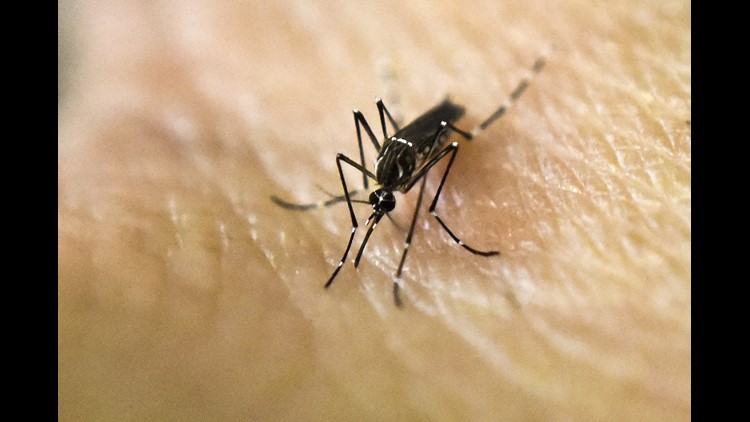If you feel like you've been swatting a lot of mosquitoes these past couple days, you're not alone.
The Placer Mosquito and Vector Control District posted a Facebook notice addressing reports of an increase in mosquito activity in the area.
As it turns out, there is currently a rise in the "rice field mosquitoes."
But why?
Well, the rice field mosquito, formally known as the Anopheles mosquito, is a little confused about the seasons. This mosquito is different because it's one of the few mosquito species in the area that is an adult over winter, according to Ada Barros, spokesperson for the Placer Mosquito and Vector Control District.
The Anopheles mosquito is in a hibernating-like state over the winter, often resting in plants such as bushes or trees, under decks or anywhere which shelters them from the cold. They are commonly a problem in agricultural or ag-adjacent areas.
Given the current higher than normal temperatures in the area, the mosquito is being tricked into coming out of hibernation.
"In a warm cell of 65 degrees of higher, they come out thinking it's spring," Barros said.
After coming out of hibernation, the mosquitoes are hungry and aggressive to feed. You may feel they're after you because they actually are.
The Anopheles mosquito may even try to get into your home at night.
It's been a wet winter, but water is not related to this pesky mosquito.
Contrary to popular belief, the Placer district said the mosquitos are not coming from any sources of standing water. Additionally, the mosquito doesn't carry West Nile virus or any other human transmitted diseases. Also, the winter period for the Anopheles is generally short, only about three to four weeks. It can also be cut short by a drop in temperature or by rain.
Barros said, these mosquitoes typically come out every winter, especially in recent years.
ABC10 received reports of there being an influx of mosquitoes near the Oroville dam.
Well, the reports are true.
"All the emergency workers on the dam are complaining about mosquitoes," said Matt Ball, district manager for the Butte County Mosquito and Vector Control District.
Ball said, the Butte district is doing their best to help the workers, handing out repellent in the area.
The Anopheles mosquito is especially high in numbers right now because this past week was the first time this winter the region saw temperatures of 65 degrees or higher, according to Ball.
The insects are not attracted to the wetness near the dam.
"This has nothing to do with the rainwater." Ball said. "It has everything to do with the warm, beautiful weekend we just had."
While the mosquitoes' presence is normal this time a year, there may be more of them this year because more rice was planted this year than in years before, during the drought.
Ball said the District is receiving up to 30 calls a day about the mosquito but explained this issue isn't a phenomenon.
Wintertime mosquitoes similar to the Anopheles are also seen in Sutter and Yuba counties.
The Sutter-Yuba Mosquito and Vector Control District released a statement last week on their website assuring local residents that seeing mosquitoes in the winter is normal in the region:
"On sunny days in February and sometimes into March it is not uncommon to be bothered by mosquitoes looking for a bloodmeal. We historically see this at this time every year."
The Sutter-Yuba district said, winter adult mosquitoes wake up looking to feed, in order to make to the spring. The mosquitoes are not breeding or laying eggs during their brief wake period mid-winter. They feed and go back into hiding.
While Barros could only confirm the Anopheles mosquito's presence in the Placer County area, it's safe to say the agriculture-loving insect is flying somewhere near you, especially if the area is near rice fields.
Why not spray for mosquitoes in the winter?
According to Ball, Butte District cannot fog for mosquitoes in the winter and early spring months because it's ineffective compared to the warmer spring and summer months.
During warmer months, the District can spray for mosquitoes at night, after the sun sets and before it rises again. During cold months, it's not warm enough to spray at night.
Even though wintertime mosquitoes are most active during the day, the District can't spray during the sunlight hours because the UV rays reduce the pesticide's effectiveness and it also poses a risk to non-target beneficial insects.
How can you protect yourself from these wintertime mosquitoes?
The Anopheles mosquito generally comes out to feed between 1:00 pm and 5:30 pm, which are high sunlight hours. If you're going to be outside during peak mosquito hours, the best thing you can do to prevent bites is to wear insect repellent.
The Centers for Disease Control and Prevention (CDC) recommends using DEET. For more information, visit the CDC mosquito prevention website.



